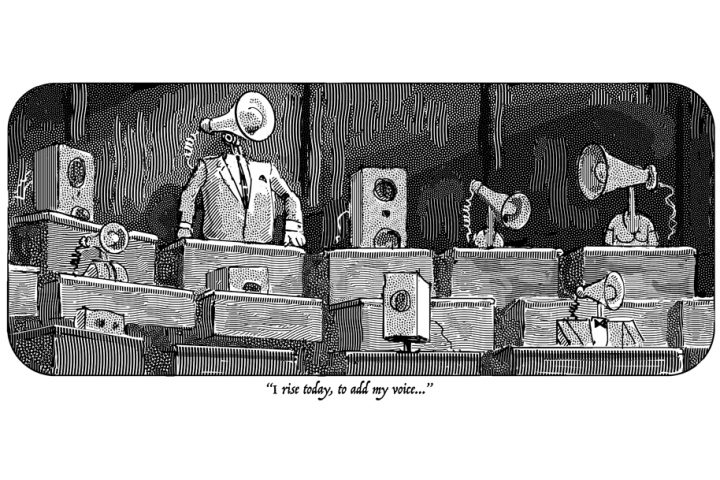The Trump Tower has 58 floors, but, mirabile dictu, the Trumps’ apartment is on 68. And, presumably, the president can take down his faked Time magazine cover portrait at Mar-a-Lago now that he has a real one. As one might expect from someone so unstuck from fact, though he is capable of breathtaking doublespeak, he does it with such unimpeachable (no allusion intended) and genuine sincerity that it is no more shocking than if a homeless person claimed to be Napoleon.
When doublespeak is less, shall we say, looney, and uttered or written in such a way as to pretend to thought, reason, logic, or law, it is an aggression against general intelligence and should be an occasion for anger. Particularly in politics, no reason exists not to be livid in reaction to the rhetorical methodology of thieves, con men, grifters, cheats, liars, and three-card monte dealers. And yet such language is employed, at what used to be the highest levels of political discourse, by the arrogant, grasping worms (I am told that worms cannot grasp, but what about Dick Durbin?) who would presume to lead us.
For example, because abortion on demand and without restriction—the holiest sacrament of modern liberalism—has so divided the electorate, it is a problem for politicians who are for it but would ostensibly be against it, and those who are against it but would ostensibly be for it. Less-than-courageous political aspirants must thread this needle, especially in heavily Catholic “blue” districts, and doubly so if they themselves are Catholics.
To do so, they have come up with an exquisitely pusillanimous straddle so common that purely by formulaic repetition it generally fails to produce the contempt and derision it deserves. They imagine they can get away—and mostly they do get away—with being the face of Janus, Doctor Dolittle’s pushmi-pullyu, or the human manifestation of the late Senator Arlen Specter’s “Scottish verdict” (in order to avoid voting guilty or not guilty) in President Clinton’s impeachment trial. A more contemporary cultural reference might be to the comedy show Little Britain’s Vicky, the eye-darting, lumpenproletaria-esque, fat girl whose answer to every challenging question is “Yeah, but no, but yeah but no, but yeah but no but yeah.”
That is, like Mario Cuomo as described by Vincent Cannato in the Winter 2018 CRB (“A New York State of Mind”), they claim to be “personally” against abortion, but would leave it up to “a woman and her doctor.” This assumes the division of oneself into personhood, and what else? Granted, one would not want to force into law one’s personal preference or distaste for or against, let’s say, chipotle peppers or disco music, but to treat abortion as a matter of inexplicable, anachronistic religious doctrine; arbitrary preference; or capricious taste is to demonstrate conceptual blindness or bottomless moral cowardice.
If an unborn child were not, as in fact it is slightly more than half the time, of a different sex than the mother; if it did not have a completely different and unique DNA; if it were not viable from the start and would not survive to term and then, statistically, for 80 years more thereafter given only the absence of an act of destruction; if abortion opponents were consistent in using the emotive, Anglo-Saxon word woman and not switching to the Latin fetus instead of baby or child; if the stupidity of the question “When does life begin?” was not affirmed by the fact that the sperm and the egg are alive before the question is unnecessarily formulated; if only one body, not two, gave rise to the conflict; if in common and statute law there were not long-standing strictures upon what we may do even with our own bodies; and if the destruction of one’s progeny were not contrary to every biological imperative, decent human impulse, and civilized principle, only then—and perhaps not even then—the question would not be, is this the taking of an innocent human life, or is it not?
* * *
But as it is the question, it does not warrant assignment to the logically and philosophically specious category of inconsequential and morally irrelevant preference. The next time a spineless politician says, “I’m personally against abortion, but I think it’s a decision that should be left up to a woman and her doctor,” you might express your agreement as follows:
Indeed, I myself am personally against racism, but I think it’s a decision that should be left up to a woman and the Ku Klux Klan. I’m personally against discrimination against homosexuals, but I think it’s a decision that should be left up to a woman and Islamic State. And I’m personally against pollution, but I think it’s a decision that should be left up to a woman and the Exxon Valdez.
And so on….
Although most political and ethical issues present opportunities for nuance and compromise, some do not. When politicians engage in doublespeak, they attempt to rob democracy and reason of the element of choice, something that otherwise they inappropriately and promiscuously endorse in an effort to evade moral clarity.
Unfortunately, it may not be practical to send all such politicians, and grief counselors, to a renovated (though not too renovated) Devil’s Island. But they can be called out, and they can be ridiculed; such as when, in response to Megyn Kelly, Stormy Daniels’s lawyer asserted that his client was “a principled woman,” and the studio audience burst into laughter. As Mario Cuomo never said, but a (late) 18th-century French aristocrat might have, ridicule is the guillotine of sophistry.


